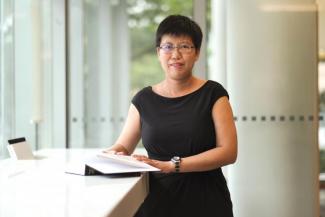
Associate Professor Wan Wai Yee studies the laws that govern mergers and acquisitions in Asia’s fast-changing landscape.

Photo Credit: Cyril Ng
By Geraldine Toh
SMU Office of Research– In theory, a merger or an acquisition can be a win-win situation for all parties, but only if the conditions are right. In every such complex corporate dealing, many advisors—from accountants to lawyers—are involved, to protect the interests of both shareholders and investors. But what if their presence adds a stumbling block to the very transaction they are supposed to facilitate?
Drawing on her extensive practical experience in corporate law, Associate Professor Wan Wai Yee, from the Singapore Management University (SMU) School of Law, studies the laws that govern Mergers and Acquisitions (M&A) in the Asian context. She also examines real-world data to understand whether legal frameworks are effective when transplanted to Asia, where the corporate landscape is markedly different.
How fair are the independent financial advisers?
Take for example the legal requirement for Independent Financial Advisers (IFA) to be involved in an M&A dealing. “The very purpose of appointing the IFA is to provide advice to the independent directors of the board of the target company as to the merits of the transaction,” Professor Wan explains. The IFA report is also disclosed to shareholders of the target company.
Between 2008 and 2010, she analysed more than 100 IFA opinions issued on takeover offers on the Singapore Stock Exchange. Published in the Company and Securities Law Journal in 2012, her analysis highlighted major shortcomings of the IFA opinions.
First, in certain cases, IFA opinions were not based on independently verified information, but on data that was publicly available or provided by the very target company that engaged their services. Second, IFAs were not obliged to justify the methodology or assumptions they use when evaluating a takeover offer, making it easier to shield a biased opinion. Finally, she discovered that inherent biases may potentially arise because IFAs may have an interest in being hired for their advisory services by the parties to the takeover or their major shareholders in the future.
To make IFA opinions more useful to the average shareholder, Professor Wan proposes the following measures: drawing up a code of conduct for IFAs to follow when evaluating whether offers are “fair and reasonable”, requiring standardised evaluation methodologies, and making IFAs legally liable for giving false or misleading advice.
Adapting to Asian contexts
Although her research has shown that the realm of M&A may benefit from more stringent regulations, Professor Wan cautions that it may not be enough simply to enact more laws and regulations.
“People will clamour for more regulations after something bad happens, like a financial meltdown—it is a knee-jerk reaction. But it’s not clear that simply having more regulations is the most appropriate solution. The real challenge is to make the laws that we have useful and effective for their intended purpose,” she suggests.
A case in point: the “legal transplantation” of the Anglo-American model of corporate governance to Asia that occurred after the 1997-98 Asian financial crisis. Unlike the US or the UK, Asian economies are dominated by companies controlled by a small number of shareholders, such as state- or family-owned firms.
Professor Wan notes that Asian countries such as Hong Kong and Singapore have transplanted the Western model of corporate governance, in particular, requiring independent directors, as well as making it easier for investors to seek legal recourse in case of breaches of fiduciary duties or market abuse. But there is still limited real-world evidence for whether legal transplantations, modified or otherwise, will actually work as intended.
Professor Wan has recently secured a grant under the Singapore Ministry of Education Academic Research Fund Tier 2 for a study that she is working on with colleagues from SMU and Hong Kong. The study examines cross-sectional and longitudinal data on firms in Singapore and Hong Kong over a 15-year period (2000-2014), with the aim of assessing the effectiveness of transplantation of the Anglo-American model of corporate governance on Hong Kong and Singapore through a variety of measures.
A guide to M&A in Asia
Professor Wan’s extensive practical experience in the area of M&A law in Singapore led her to the task of writing a practice-oriented book on the subject. Written in collaboration with Assistant Professor Umakanth Varottil from the National University of Singapore (NUS), the 2014 book Mergers and Acquisitions: Law and Practice guides the reader through M&A in Singapore, discussing practical issues, pitfalls and tactics.
She describes the writing of this book as a necessary but challenging task. “We wanted to address the needs of the professional and academic communities and much of the valuable information on this important area was available only within law firms, and not readily accessible to public,” she explains.
With many Asian economies maturing and opening up, as well as ASEAN economic integration on the way, the need for contextualisation of the law in Asia will be even greater, Professor Wan observes. Such empirical and comparative analyses of Asian “experiments”, she believes, will shed light on how best to adapt Western-derived corporate governance frameworks for Asia, and assist regulators as well as users of financial services in making informed decisions.